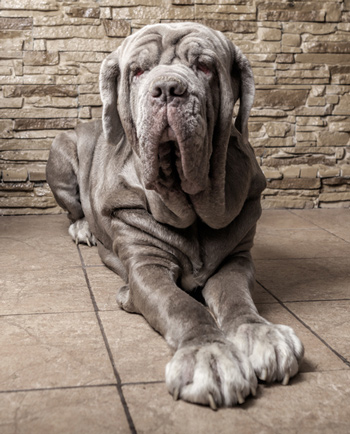Entropion in Dogs

Entropion is an abnormal eyelid conformation that can occur in dogs. Dogs with entropion have eyelids that curve inward, causing their eyelashes to rub against their corneas.
The condition may affect one eye or both, and it may involve all or parts of the four eyelids.
Causes of Canine Entropion
Entropion is usually a genetic condition in dogs. In these cases, the entropion appears before a dog's first birthday.
Sometimes entropion can develop secondary to another condition. For example, damage to the eyelids or the nerves that control them may result in entropion in a dog that was not otherwise affected by it.
Dog Breeds Most Commonly Affected by Entropion
When entropion is inherited, it commonly affects dog breeds that are brachycephalic, with short noses and prominent eyes. It is also more common in giant breeds. Below are some of the dog breeds commonly affected by entropion:
- Pugs
- Boxers
- Mastiffs
- Chows
- Great Danes
- English bulldogs
- Shar-peis
- Saint Bernards
- Rottweilers
Signs of Canine Entropion
It may not be obvious to you that your dog has entropion because of swelling, extra skin, or squinting of the eyes. If your dog exhibits any of the following signs, entropion may be the culprit, and you should make an appointment with your veterinarian right away to evaluate the problem.
- Squinting
- Ocular drainage
- Redness of the whites of the eyes
- Swelling of the soft tissues around the eye
- Rubbing or pawing at the eyes
- Sensitivity to light
Diagnosis of Entropion in Dogs
Your veterinarian will be able to diagnose your dog with entropion by carefully examining the affected eye(s). The doctor may place a drop of anesthetic on the eye(s) first, to alleviate pain so the eye exam is more comfortable for your dog.
The veterinarian will be able to see whether the eyelids or any portions of them curve abnormally inward. Fluorescein dye will also be applied to your dog's cornea(s) to evaluate whether rubbing eyelashes have caused a corneal ulcer.
Treatment of Canine Entropion
The treatment that is chosen for your dog's entropion will depend on its severity and the age of your dog. Without treatment, your dog will be in constant discomfort and may eventually become blind.
If the entropion is the primary problem, your veterinarian may use one or more of the following treatments:
- Eye lubricant medications +/- antibiotic drops for secondary infections. This is only a symptomatic treatment, and it does not correct the turned-in eyelid.
- Eyelid surgery. Young dogs that are not finished growing may have a temporary suture placed in the affected eyelid(s) to protect the cornea. Once a dog is finished growing, eyelid reconstruction surgery can be performed to eliminate the entropion permanently.
If the entropion is found to be secondary to another problem, that will need to be treated right away.
Similarly, if the entropion has caused another problem, usually a corneal ulcer, that will need to be treated, as well.
Prevention of Entropion in Dogs
Dogs that have primary entropion (not caused by another condition such as trauma) should not be bred. Eliminating dogs with entropion from the breeding population is the only way to reduce the incidence of this inheritable condition.
You May Also Like These Articles:
A General Guide to Puppy Safety
Canine Epilepsy: Seizures in Dogs
Restrain Your Dog While Driving
A Hidden Laundry Room Danger for Dogs: Laundry Pods
Things We Do That Annoy Our Dogs - Slideshow
Quiz - Test Your Cold Weather Dog Knowledge
Disclaimer: This website is not intended to replace professional consultation, diagnosis, or treatment by a licensed veterinarian. If you require any veterinary related advice, contact your veterinarian promptly. Information at DogHealth.com is exclusively of a general reference nature. Do not disregard veterinary advice or delay treatment as a result of accessing information at this site. Just Answer is an external service not affiliated with DogHealth.com.
Notice: Ask-a-Vet is an affiliated service for those who wish to speak with a veterinary professional about their pet's specific condition. Initially, a bot will ask questions to determine the general nature of your concern. Then, you will be transferred to a human. There is a charge for the service if you choose to connect to a veterinarian. Ask-a-Vet is not manned by the staff or owners of DogHealth.com, and the advice given should not delay or replace a visit to your veterinarian.


